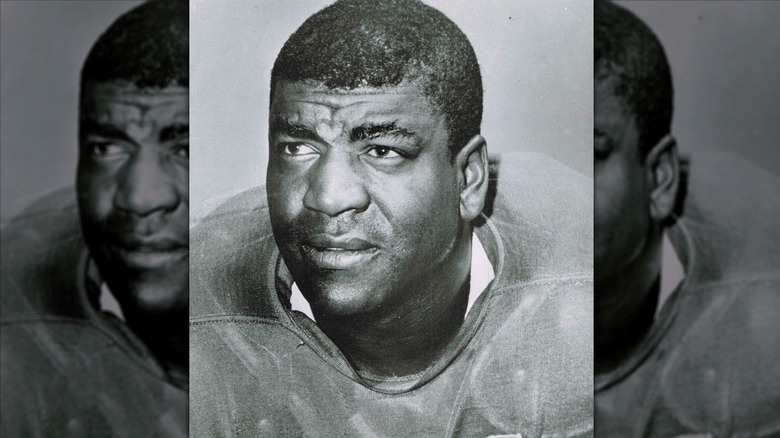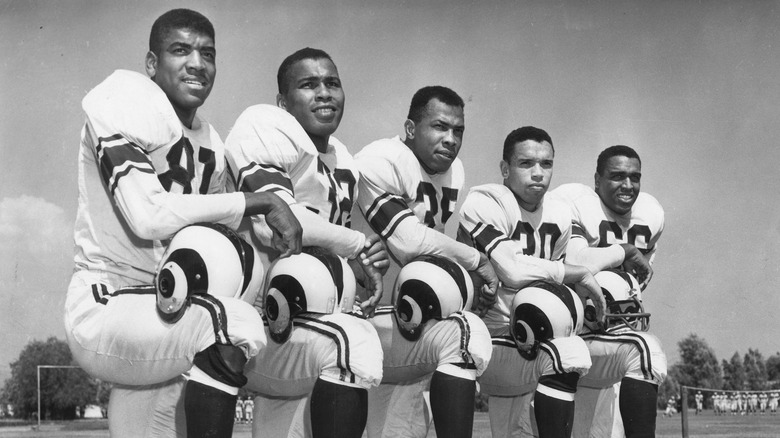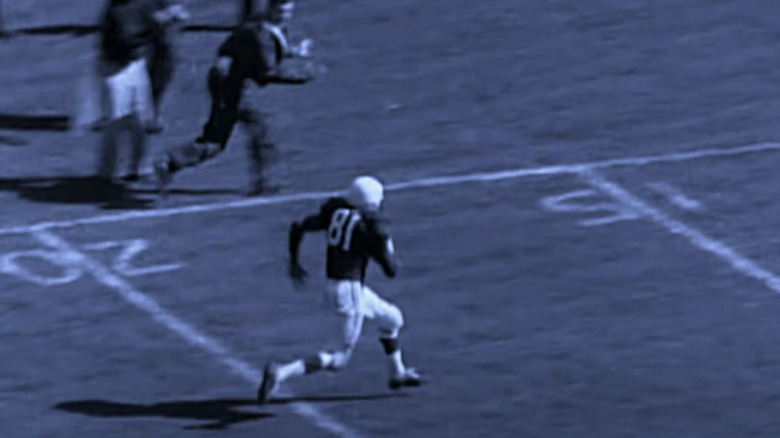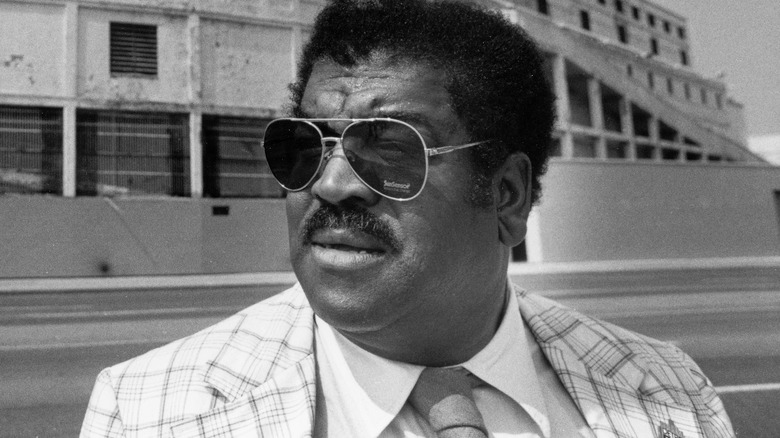Night Train Lane Went From Abandoned Baby To One Of Football's Greatest Players
Long before the likes of Richard Sherman and Jalen Ramsey became household names (or were even born, for that matter), Dick "Night Train" Lane was the standard by which NFL defensive backs were measured. At 6-feet-1-inch and close to 200 pounds, he was an impressive physical specimen for his era, and his combination of speed and strength made him a nightmare for opposing receivers to deal with. Not only was he feared as someone who could intercept passes and run them back for touchdowns; he was also known for the "Night Train Necktie," which was simply a gridiron equivalent of a pro wrestling clothesline.
Such is his legacy that many defensive backs who followed in his footsteps credit Lane for revolutionizing the cornerback position as it is now known. "He's one of the guys who transformed the cornerback position: a physical cornerback who could also make plays on the ball," said All-Pro mainstay Aeneas Williams, who played 16 NFL seasons in the '90s and 2000s. Detroit Lions legend Lem Barney, who took over from Lane following the latter's retirement, likewise recalled how he and many of his peers referred to Night Train as the "Godfather of the Cornerbacks."
That's pretty high praise indeed for any NFL icon, but Lane's accomplishments in professional football are made even more impressive by the fact he took a rather unusual — and rough — path to stardom, one that started when he was left in a dumpster by his parents as an infant.
Lane was only 3 months old when he was abandoned by his parents
Richard "Dick" Lane was born on April 16, 1928, in Austin, Texas, and was abandoned at just three months old by his mother, a sex worker, and his father, a pimp who was known around town as "Texas Slim." He was then spotted by a local woman named Ella Lane, who adopted him after finding him crying in a dumpster, wrapped in old newspapers.
As documented by Notable Biographies, Ella Lane ran a tight ship and required her adopted son to complete various chores around the house. She also frequently resorted to corporal punishment, whipping him with a belt at one point for coming home with ripped clothes after playing football with some neighborhood kids. Many years later, Dick Lane would look back on the physical abuse he received from his adoptive mother while growing up. "I'm screaming and yelling so hard, some people yelled over the back fence, 'Ella, what are you doin' to that boy?' I'm sure they thought I was being murdered," he recalled to The Statesman in 2001.
If you or someone you know may be the victim of child abuse, please contact the Childhelp National Child Abuse Hotline at 1-800-4-A-Child (1-800-422-4453) or contact their live chat services.
He was not your traditional NFL prospect
Even in an era where college and pro scouting wasn't as sophisticated as it is today, Dick Lane's road to the NFL was anything but conventional. He was a three-sport star at L.C. Anderson High School in Austin and excelled the most in football, leading his school to a state championship in 1944 and a runner-up finish in 1945 (via Pro Football History). However, he didn't opt right away for a college football career; after reconciling and reuniting with his birth mother, he moved to Nebraska, where his baseball skills caught the attention of Negro League scouts. He played for the minor-league Omaha Rockets before enrolling at Scottsbluff Junior College and playing one season for their football team.
After making the All-Nebraska team and the NJCAA All-American team as a junior college star, Lane served four years in the U.S. Army and continued to excel on the gridiron, earning first-team All-Army honors in 1951. In a time when it still wasn't uncommon for football players to go both ways, he was mainly recognized for his offensive prowess, catching 18 touchdown passes in the 1951 season. As such, it wasn't surprising that he still had a yearning to play in the pros as he returned to the civilian world. Unsatisfied by his blue-collar job at an aircraft factory in Los Angeles, Lane visited the Los Angeles Rams' office in 1952, showed team officials a scrapbook of his newspaper clippings from his time at Scottsbluff (as old-school a highlight reel equivalent as you can get), and asked for a tryout.
An unlikely star is born, and so is an iconic nickname
According to Pro Football History, Dick Lane initially tried out as a wide receiver with the Los Angeles Rams, a team that was incidentally entering the 1952 NFL season as the league's defending champions. But the Rams' coaching staff saw more potential in him as a defensive back, and when the club played its first scrimmage on August 3, 1952, Lane was, according to a report from the Los Angeles Times, by far the best player in the scrimmage. "Lane came out here to make the ball club," Rams head coach Joe Stydahar told the outlet. "Well, last night he got himself a job."
The L.A. Times report also documented the origin of Lane's "Night Train" nickname — apparently, he just loved dancing to Buddy Morrow's song of the same name whenever his teammate Tom Fears would put it on his record player. And some of you must have been thinking he got it because he tackled opponents with the ferocity of a speeding train — good guess, and quite plausible considering Lane's aggressive tackling style, but as it turns out, pretty far from the real origin of the moniker.
The NFL (in conjunction with the Associated Press) didn't give out Defensive Rookie of the Year awards until 1967, but if they did back in 1952, Night Train Lane would have likely run away with the trophy. That season, he racked up a total of 14 interceptions — an NFL record that still stands seven decades later.
Lane went on to play 14 seasons in the NFL
Unlike many a rookie sensation who tapers off after their sensational freshman season, Night Train Lane kept chugging on as his NFL career progressed. And while he didn't come that close to breaking his single-season interception record, he was named to the Pro Bowl seven times in a career that spanned 14 seasons and included stints with three teams. After two years with the Los Angeles Rams, Lane was traded to the Chicago (now Arizona) Cardinals in 1954, where he once again led the NFL with 10 picks in his first year with the organization. Unfortunately, his timely interceptions and bruising tackles weren't enough to turn the Cardinals' fortunes around, and he was traded to the Detroit Lions in 1960. That's right — he played for not just one, but two allegedly cursed NFL teams.
Although Lane was already in his early 30s at the time he joined the Lions, Detroit's future Hall of Fame linebacker Joe Schmidt called his acquisition "one of the greatest trades that will ever be made in any sport," as quoted by Pro Football History. Lane continued playing at a high level despite his advancing age, but by 1964, injuries started slowing him down significantly. Following the 1965 campaign, he retired from pro football at the age of 37, finishing with 68 career interceptions, five of which were returned for touchdowns.
Life after professional football
Dick "Night Train" Lane was inducted into the Pro Football Hall of Fame in 1974, some nine years after he played his last NFL game. At that time, he had just recently wrapped up his stint with the Detroit Lions, where he continued serving the team in an administrative capacity following his retirement (via Pro Football History). After working as an assistant coach in the college ranks for Southern University and Central State University, Lane returned to Detroit to manage the city's Police Athletic League (PAL), doing so from 1975 to 1992.
Speaking to the Detroit Free Press in 1987, Lane explained the reason why he accepted the job, and he mentioned his rough upbringing as a driving factor behind his desire to keep young people out of trouble through sports. "I was a kid who was thrown away, and a foster mother raised me," he told the publication. "I've always had that love for youth, and for the organizations that aided youth in the cities I played in." Running the PAL was nothing new to him, though, as he had supervised a Chicago youth center during his time playing for the Cardinals in the 1950s.
Lane was 73 years old when he died of a heart attack on January 29, 2002, in his hometown of Austin, Texas (via The New York Times).





